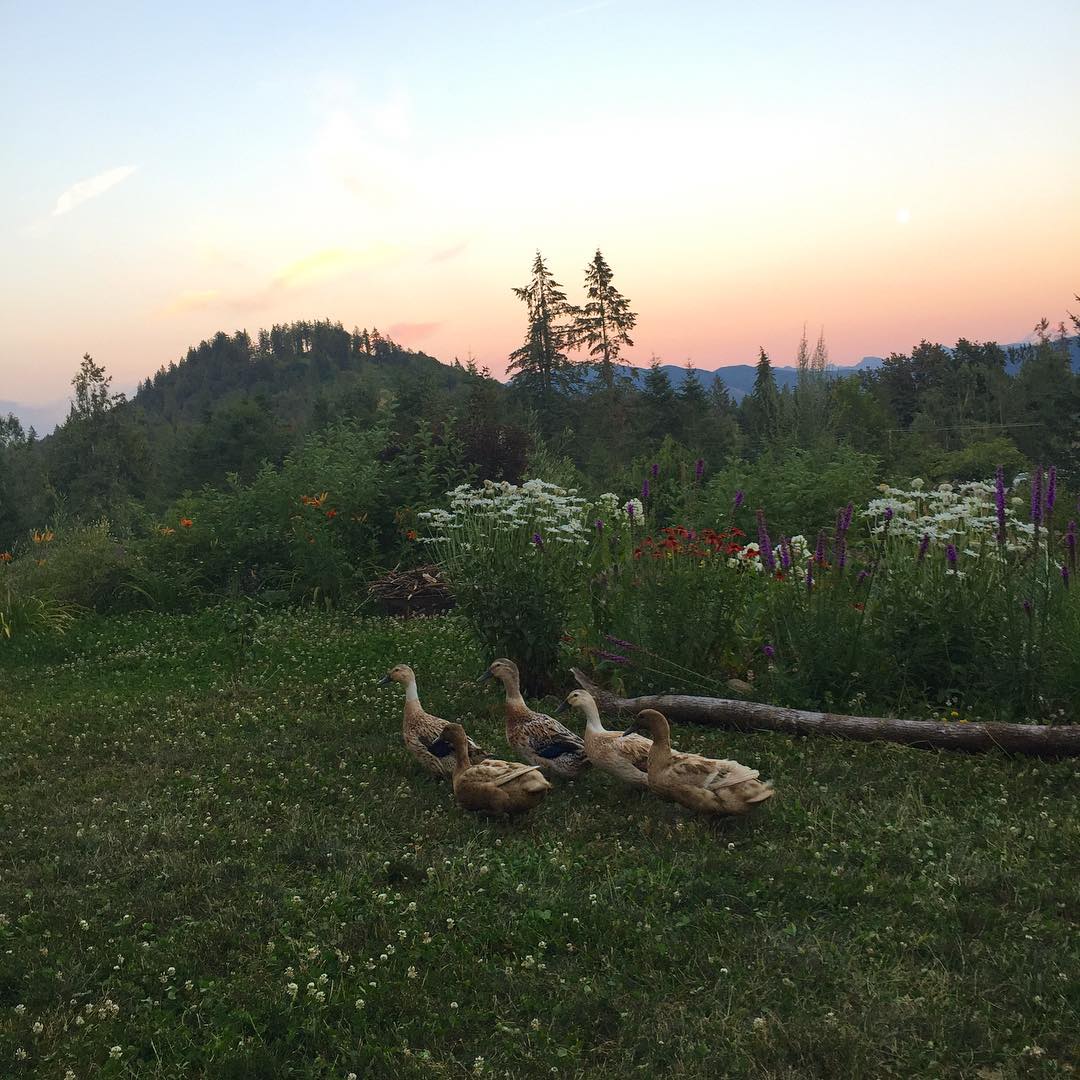Illegal slug patrol at sunset
Let me start off by saying that farming has never been an easy gig. Even when land was cheap (or free!) back in the early settlers days it required personal sacrifice, hard work and dedication.
But let’s look at today, especially in British Columbia’s fertile Fraser Valley. First there are land prices. If you think housing is expensive in Vancouver, wait till you try to buy acreage. Today I perused a few listings - the cheapest bare land in Langley was just shy of $4m for close to 20 acres - that is $200k per acre without a house. But Langley is pretty popular with city folk who want to live the life of country gentry while they commute to their 6 figure jobs in Vancouver. So, how about Mission, North of the Fraser, last bastion of affordable homes and land. It’s where I live so I am pretty familiar with the area. My land value is assessed at about $225k per acre (excluding the house). Regular building lots are going for as much as $500k in the area. So the cost to buy land is out of range for most people.
But if you can afford the land that is just the beginning of the toll on your wallet. In my case I had to clear land, put in a driveway, put in septic, drill a well, get a house onto the property, fence the perimeter and cross fence (in my case about 1200 linear feet at $8/per foot!), reconfigure the land to mitigate water coming into my house, and then, start working on the soil because even though it was farmland with great light and plenty of water, it is not good growing soil. So all this added up to about $500k on top of the land cost and I am still living with plywood floors and bare drywall in areas.
When I bought my land, I thought I had done my research. I bought land that was zoned Small Scale Agriculture and had farm status. Little did I know that Mission has the most restrictive and borderline punitive zoning bylaws regarding farmland. Due to recent events I began looking at the bylaws in neighbouring areas. It gets rather confusing because each area defines and writes their bylaws differently so you have to dig to find information. In fact Mission does not even include the definition of small scale agriculture with the zoning bylaw. You have to go look for the definition. Mission has also been systematically eliminating ALR from the area. And this is not new - at least ten years ago 1000 acres was bought by Genstar for a major development. Recently Polygon took it over and started releasing their plans.
Mission has not followed any of the bylaw standards recommended by the Ministry of Agriculture nor has a committee to address farming issues like Maple Ridge. In fact the uses allowed for Small Scale Agriculture make it next to impossible to actually have a sustainable farm unless you break the law. Being zoned for Small Scale Agriculture only allows a farm to have 1 chicken hen (no roosters) per 375sqft of land, one horse or cow per .88 of an acre, and bees. So that means no goats, no sheep, no llamas, no alpacas, no ducks, no turkeys, no geese etc. A small scale farm is not even allowed to have a tractor or farming equipment. Meanwhile the local government has blythely ignored the bylaw guidelines put forth by the Ministry of Agriculture created to support sustainable farm practices.
But ignorance is bliss and fenced and cross fenced, started mounding for beds, built a greenhouse, planted an orchard (which I fenced in for my chickens) and built a coop as well as a shed on the bottom of my property. I also brought in goats to help clear the scrub trees and blackberries as well as add organic matter to my bottom two pastures. Meanwhile some people bought the land beside me and built a huge house on it. The house itself is massive and they sited it so it looks over my property resulting in me have no privacy at all. One of the recommendations by the Ministry of Agriculture is to have buffer areas between farms and residential land. Hopefully this can be addressed with trees I have planted and the orchard.
All was going kinda well, until the rooster crowed.
Since then they have filed complaints about my rooster (although he only crowed about 5-6 times per 24 hrs that was ruining their ability to have visitors), my chickens (who apparently went over the 5 ft fence and ate some of their blueberries), my shed (it ruins their view of my property), and my dogs (they ate some of their compost). I also was helping out a friend by having her mini donkey in my bottom fields while they dealt with predator issues. Although he was at least 150 feet from their house and I sent them an email that he was just here for a few weeks that resulted in them blasting me in writing and at my door at 5:50am on a Sunday (he had brayed once at 2am and once at 5am, likely because there was a bear (it has been leaving scat in the property on the other side of us). Meanwhile the only reason they stopped their dogs from coming onto our property and chasing our chickens (they told me I should move my coop so it would not be in the view of their dogs) is because they thought we would shoot their dogs (while it is my legal right to shoot a dog harrassing my livestock anyone who knows me would find this laughable).
Because of the multiple visits from bylaw officers I have since learned that bylaws are permissive. This means you are ONLY ALLOWED what is there in writing. Being zoned for Small Scale Agriculture only allows a farm to have 1 chicken hen (no roosters) per 375sqft of land, one horse or cow per .88 of an acre, and bees. Nothing else. Nothing. A small Scale farm is not even allowed to have a tractor or farming equipment.
Now lucky for me another neighbour has offered to store a tractor for me so hopefully I wont end up trying to hand till 2 acres - it is simply not possible. And a representative from the Ministry of Agriculture has stepped in and said any nuisance complaints by my neighbours must go through her from now on.
But if farms are unable to farm without breaking the law, what does that say about our local governments. It is patently obvious that they favour developers over farmers. Especially where I naively chose to put down roots.
Even the Fraser Institute has declared war on farmers. Here is an excerpt from The BC Agricultural Land Reserve: A Critical Assessment:
"British Columbians have grappled with land use restrictions that rank among Canada’s most severe since the Agricultural Land Reserve (ALR) was established in 1973. The rationale for denying citizens the full use of 4.7 million hectares of property has shifted over time, from rescuing the “family farm” to preserving “green space” and, most recently, protecting the “local” food supply. The costs of this social engineering, which include soaring housing prices resulting from a scarcity of land for development and the incalculable loss of property owners’ economic freedom, are substantial. This paper examines some of these costs in order to promote a re-evaluation of the government’s excessive interference in the agricultural sector.
Champions of the ALR claim that the land use controls are necessary to ensure a “local” food supply. But BC consumers have shown an undeniable preference for greater choice. The vast majority of BC consumers buy great quantities of imports and base their purchase decisions on a range of legitimate factors, including price, variety, and convenience, rather than product origin alone. Indeed, after three decades of the ALR regime, BC farmers produce just one-third of the food needed in the province to meet the standards of a “healthy” diet (British Columbia, Ministry of Agriculture and Lands, 2006)."
In other words, we should eliminate the ALR and reduce farming because we need housing and people would rather import their food from places like China and Mexico.
Hmmm. I am trying to grapple with this while I look at the giant luxury home beside me with an acre of grass that they cut with a rider mower. According to the Fraser Institute this kind of housing is integral to our economic well being. Forget the idea of farmers growing and raising food that does not have to be trucked thousands of kilometres or brought by shipping tanker from China. Let’s just add more Co2 to the atmosphere in the name of luxury because they pay higher property taxes.
But here’s another excerpt from the Fraser Institute document:
"Researchers have discovered that the most significant “cost” of food miles, by a large margin, is consumers’ shopping trips to the store and not the commercial distribution of food. Furthermore, the more consumers rely on unprocessed, locally grown agricultural products—thereby necessitating more frequent trips to the store and longer trips to farms and farmers’ markets—the more food miles increase."
So apparently we should all be eating processed food that we import in order to be more environmental. Hmmm.
Meanwhile the Provincial Government implemented a new law that all farmers are required to register their wells and pay to use them. The average well costs about $30k plus there are costs to filter the water plus run and maintain the wells. Now before you start going on about aquifers being over used etc, you should know that not all wells access aquifers. Mine is what is known as a rock well so it just gets filtered ground water. So asking a small scale farmer to pay more just seems petty. What really concerns me though is that a company like Nestle can get a license for the water on my land and there is nothing I can do about it.
It all comes down to money - big business and luxury homes rule. We should all be importing processed foods, revering luxury homes over farms, and not worrying about food security or food sovereignty. There’s lots of food in China and Mexico and they have cheap labour. So let's just head to Walmart or Costco rather than the farmers market, it is far better for the environment.
Farmers are not getting rich from their investment in land, infrastructure and time. Most farm families have at least one income coming from another source. Is it no wonder the average age of a farmer is 56 and most do not have a succession plan? The Federal govenment proposed tax changes last year that will increase the tax burden facing family farms, and more than anything, increasingly complicate intergenerational farm transfers. So passing on the family farm might not be a viable option even if there are children who want to take it over.
At the rate all this is going I simply do not see how small scale farms, who do not do factory farming, will survive.
I think it is time that we changed that.



